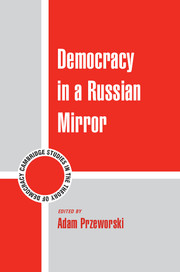Book contents
- Frontmatter
- Contents
- Contributors
- Introduction
- PART I RUSSIA
- 1 Peculiarities of Russian Politics
- 2 Imitating Democracy, Feigning Capacity
- 3 Russian Perspectives on Democracy, Political Emancipation, and Integrity
- 4 Color Revolutions and Russia
- PART II DEMOCRACY IN A RUSSIAN MIRROR
- PART III PATHS OF POLITICAL CHANGE
- Afterword: Open Issues and Disagreements
- References
- Name Index
- Subject Index
1 - Peculiarities of Russian Politics
from PART I - RUSSIA
Published online by Cambridge University Press: 05 June 2015
- Frontmatter
- Contents
- Contributors
- Introduction
- PART I RUSSIA
- 1 Peculiarities of Russian Politics
- 2 Imitating Democracy, Feigning Capacity
- 3 Russian Perspectives on Democracy, Political Emancipation, and Integrity
- 4 Color Revolutions and Russia
- PART II DEMOCRACY IN A RUSSIAN MIRROR
- PART III PATHS OF POLITICAL CHANGE
- Afterword: Open Issues and Disagreements
- References
- Name Index
- Subject Index
Summary
THE LAW OF THE PENDULUM
One of the peculiarities of Russian politics is that over the past two centuries, all the attempts to modernize Russia's political system have veered from one extreme to the other. The attempts to modernize the autocratic government in tsarist Russia ended in the chaos of February to October 1917, which gave rise to the totalitarian regime of Bolshevik Russia. Thus, the pendulum of Russian power traveled from the extreme right to the extreme left, lingering for a while in the center to see the chaotic disintegration of the old institutes and values.
The lack of culture of democratic self-organization, the inability to achieve compromise through negotiation and mutual concessions, the absence of stable institutions of civil society, and the existence of deep demarcation lines based on social, economic, ethnic, cultural, and confessional principles predetermined both the collapse of old tsarist Russia and the rise of the new despotic power in place of it.
What happened in Russia in 1917 closely resembled Tocqueville's description of the revolutionary transformations in France after the fall of the old regime. He pointed out that one should be very cautious with democratization of the political system in a country that has no strong democratic traditions or culture. The people cannot keep up with the fast changes, the situation escapes the reformers' control, and the process assumes a life of its own, which more often than not results in chaos and in the disintegration of the old institutions and values and gives rise to a new form of tyranny, sometimes even more terrifying than the one of which reformers wanted to rid themselves.
It was this realization of the threat of new chaos and collapse in the Soviet Union as a result of Gorbachev's radical reforms during the years of perestroika that motivated me to write a number of articles in 1988–90 warning of the impossibility for the USSR to make a direct transition from bureaucratic totalitarianism to democracy because such a transition in a society with no infrastructure for establishing democratic institutions and values would inevitably end in chaos and pose a threat of civil war in a country stuffed with tens of thousands of nuclear warheads.
- Type
- Chapter
- Information
- Democracy in a Russian Mirror , pp. 7 - 29Publisher: Cambridge University PressPrint publication year: 2015
- 1
- Cited by

